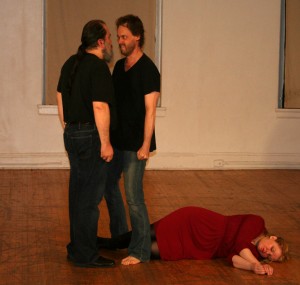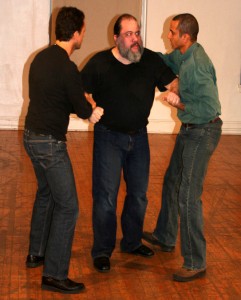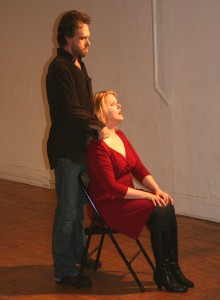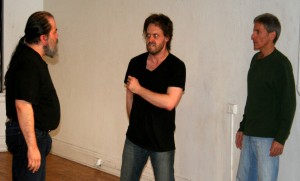
Gowan Campbell, Stewart Walker, & Lisa Blankenship
In a time when one goes to theatre and dramatic sets are used to make up for mediocre acting so that something kind will at least be said in the review, the first thought that I had when taking my seat at Folding Chair Classical Theatre’s production of The Duchess of Malfi was one of confusion. Were they really set up? Where was the set? A bare stage with minimal spotlights?
Boy, was I in for a treat. Let me say up front that this was a great production – but I had to first get into the mindset, because I honestly was not prepared for what I actually consider to be the true test for actors: can you do the show and move the audience just being up there with nothing but yourselves? And I was very happy to find out that with this company, the answer is YES.
As the time drew nearer for the production to actually “begin”, actors began to enter the stage area, talking amongst themselves, sipping glasses of wine that were mimed (or, depending on one’s craft, truly created) and eating hors d’oeuvres out of the air.
Due to the lights set up the way they were, there was also the knowledge (having been on stage myself) that the actors, though somewhat blinded of the audience by the lights, would still be able to see us – which explains why I was busy talking to a fellow actor/friend in the audience on the other side of the room before I got back to my seat – and the show promptly started; silly me – I thought the lights were going to go down. I was holding up the show.

Tony Travostino, Gowan Campbell, and J Paul Nicholas
And as this play by John Webster, originally published and performed in the early 1600′s and loosely based on events that occurred in the 1500′s, began to unfold, I realized that the play was really starting! No costumes, no set, nothing but a folding chair in the corner. Had I read the last little blurb in the program, I would have seen that this was the main manifesto of this company: “…(to) tell stories using nothing but actor bodies and voices – and the writer’s words.”
My thoughts? “This is going to be a train wreck or amazing – there will be no in-between.”
Because my opinion, actually, is that most theatre can be done, if necessary, with the most minimal of sets – if the acting is good enough. If it is, then the audience will be focusing on the work – and the set will disappear and nothing will be important but the actors really dealing with each other and taking each moment with each other (in all due respect to the many wonderful set designers out there who make many a show look FABulous).

Lisa Blankenship and Stewart Walker
In this play that has often been not put up since the 1600′s to even now due to the sexual undertones and dramatic violence that occurs, The Duchess (played with a beauty and strength by Lisa Blankenship) is recently widowed. Her two brothers Ferdinand (a powerful and mesmerizing Stewart Walker) and The Cardinal (Larry Giantonio) make her swear to not marry again because they want her share of the inheritance. But Ferdinand also has other reasons; there is very much an incestuous desire for his twin sister that makes the mere thought of her with another man fly into a rage. He asks Bosola (an amazing Gowan Campbell), a family servant who has no issues committing murder for hire, to keep his eye on the Duchess in case she strays and takes a lover.
Her servant, Antonio (J Paul Nicholas), becomes her lover and husband secretly, for she knows that his life would be in peril, and has three children by him, all in secret; by use of loose clothing, etc. At their side are their only other friends: her maid Cariola (Gillian Riley, who also well-plays the seductive mistress to The Cardinal in another role), and Delio (Tony Travostino), Antonio’s friend, both of whom help keep their secrets.
As one can guess, the truth is found out, and Ferdinand is none too happy – enough to slay both his sister, her two youngest children, and Cariola before he goes completely mad as the knowledge of what he has done tears him apart.

Campbell, Walker, & Giantonio
Were there moments when it wasn’t always wonderful? Yes. I felt that it took the actors a little while to get cooking from the top of the play. But once the romance was developed between Nicholas and Blankenship, I believed it (despite some moments that felt rushed to me) and the rage/madness was allowed to slowly steep with Walker’s character, with Campbell narrating the irony of all the false pretense around him with such disgust, I was riveted. I felt the scene with the Cardinal and the mistress was unnecessary; but that is more, unfortunately, on Webster than the actors; they made some interesting choices that kept an unremarkable scene from being an intolerable diversion from the play.
I really felt that kudos should be given to director Marcus Geduld for taking a piece and doing something very different – yet very simple – with it and making us enjoy it so much. The combat swords, like the drinks, were all mimed, keeping with the consistency that had already been established. Even the murders of the children, their strangulations were mimed (no fake babies or child actors) – but it was enough to make one cringe, and be believable.
With performances especially from Blankenship, Walker, and Campbell, this show became so much larger than any set could have given it; and took it back to the roots of how it might have been performed back in the 1600′s…with nothing but the actors, their voices, and the words of the playwright…taking each moment and allowing it to spiral into chaos – and bringing the audience with it, thrilled and horrified. Well done.
–
Folding Chair Classical Theatre presents The Duchess Of MalfiThursday, October 08, 2009 through Saturday, October 31, 2009 This play has now closed








{ 2 comments… read them below or add one }
Yes. I concur, doctor.
Thanks for posting this review. I am Gowan Campbell’s sister, and it’s nice to read a review of a show I was not able to attend. There is definitely a different mind set when a company presents a show with minimal costumes and props—strips it down to the script and the acting—and it succeeds. I’ve seen examples of it when it works well, and examples of when it doesn’t work at all. Thanks for your comments!